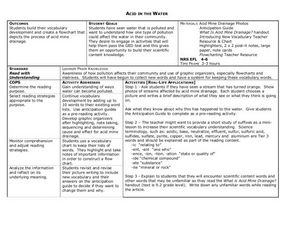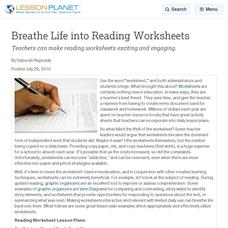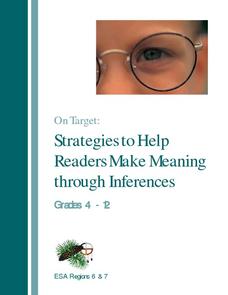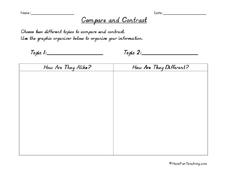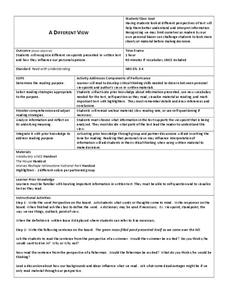Curated OER
Abigail’s War: The American Revolution through the Eyes of Abigail Adams
Four lessons, performed over four weeks, pay special attention to Abigail Adams. Fifth graders analyze primary and secondary sources, read texts, discuss and write about Adams' experience during the Revolutionary War—the Battle of Bunker...
Curated OER
Acid in the Water
Ninth graders learn about the effect pollution has on water and how this affects their community. In this environmental awareness lesson, 9th graders expand their vocabulary and create a flowchart that demonstrates the process of acid...
Curated OER
Breathe Life into Reading Worksheets
Teachers can make reading worksheets exciting and engaging.
CoreCommonStandards.com
Common Core State Standards: Second Grade Workbook
You've hit the second grade Common Core jackpot! Find over 40 pages of curriculum designed specifically for the standards, both math and language arts. Printable versions of each standard can be used as learning displays, and attractive...
Idaho State Department of Education
Lessons for Social Studies Educators
Point of view, purpose, and tone: three concepts readers of primary and secondary source materials must take into account when examining documents. Class members view a PowerPoint presentation and use the SOAPS strategy to identify an...
Read Works
Figurative Language
Here's a richly detailed unit, designed for second graders, that focuses on decoding figurative language, including similes, metaphors, personification and idioms.
EngageNY
Getting the Gist and Determining Word Meaning: Paragraphs 12–14 of Steve Jobs’ Commencement Address (and connecting to Chapter 8)
Groups use a Venn diagram to compare the theme of love and loss in Steve Jobs' 2005 commencement address to Stanford University students and Christopher Paul Curtis' Bud, Not Buddy.
Curated OER
On Target: Strategies to Help Readers Make Meaning through Inferences
Here's a resource that explicitly teaches, models, and provides readers with opportunities to practice the process of drawing inferences from text. Packed with strategies elementary, middle, and high school teachers can use, the resource...
Curated OER
Student's Self-Selected Reading Log
In this reading log worksheet, students fill in dates, book title, pages read and genre. Worksheet is a generic graphic organizer reading log.
Curated OER
Out of This World Writing!
Miss Frizzle's class provides the inspiration for your young learners! Read "The Magic School Bus Explores Outer Space," and discuss the solar system. First learners will complete a KWL chart about a planet they're assigned to. Then, as...
Curated OER
Compare and Contrast
In this compare and contrast graphic organizer worksheet, students choose 2 different topics to compare and contrast using the graphic organizer to organize their information.
Curated OER
Night of the Twister
Students use reading strategies for Night of the Twister. In this reading strategies lesson, students name five major catastrophes and books about each. Students complete a vocabulary section, make inferences and predictions, read the...
Curated OER
Beanbag Toss
In this problem solving worksheet, students examine the data presented in a graphic organizer and respond to s4 short answer math questions.
Curated OER
Author's Podcast
Second graders engage in oral and listening comprehension skills using podcasts. In this comprehension skills lesson, 2nd graders create a podcast where they read an original story. Students then listen and choose to retell the story...
Curated OER
A Different View
Readers need to understand how their personal view point may differ or change how they see the view point found in a written text. Third graders read two informational pieces and fill out a graphic organizer to help them differentiate...
Curated OER
By Faith Alone - Luther's Legacy
In this Reformation worksheet, students read a 2-page article titled "By Faith Alone-Luther's Legacy," and then respond to a graphic organizer and 5 short answer questions about the Martin Luther and the Reformation.
Curated OER
Using Color as a Pre-Writing Tool
To better understand how to compose a clear and well-organized paper, learners read short passages, write summaries, and make colored graphic organizers. This is a fully developed three-day lesson with suggested assessments.
Curated OER
Vocabulary Development
By utilizing a graphic organizer called a bubble map, young readers work toward developing their vocabulary. After reading a story, a word that has something to do with the story is put in the middle circle. Then, other words that have...
Curated OER
Charlotte's Web
Fourth graders focus on fluency by reading the book Charlotte's Web. In this reading strategies lesson plan, 4th graders partner read, do guided reading, and independent reading to increase fluency. Students use Venn Diagrams, discuss...
Curated OER
We're Booked
Students share their all-time favorite books with peers. They read and discuss the article Notable Children's Books of 2007. Afterward, they create book webs and compose reviews based on their book selections.
Curated OER
Apply Post-Reading Skills and Discuss Persuasive Text
Students put their reading comprehension skills to practice. In this interpreting text instructional activity, students read "Chief Red Jacket's Reply," and then respond to questions that require them to reason, infer, and analyze the...
Curated OER
Critical Reading Skills Worksheet
In this critical thinking worksheet, students fill out a graphic organizer about a story they read including predicting, main idea, values, and more. Students complete 5 sections in the graphic organizer.
Curated OER
Reading Short Stories
In this graphic organizer worksheet, students fill in the graphic organizer with the predictions, settings, characters, background, and more for short stories. Students complete 5 sections.
Curated OER
Context Clues, Plot Structure, Conflict, and Personal Narrative Essay
What are the elements of a personal narrative? Get your class talking by reading "The Necklace" and "A Dangerous Game." The lesson focuses primarily on defining certain vocabulary terms (like context clues, plot, conflict, climax, etc.)...



